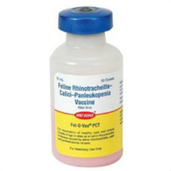Many cats will develop what appears
to be a "kitty cold" at some point in their lives. Contagious
viruses such as feline herpes virus or calicivirus are most often to
blame, but bacteria (e.g., Chlamydophyla, Mycoplasma and
Bordetella) can also be involved. Determining which "bug"
is to blame for an upper respiratory infection (URI) is usually not
necessary since most cats recover uneventfully with similar treatment.
"If your cat fails to get better on
her own or her symptoms are especially severe, take her to the veterinarian."
Which Cats Are Most at Risk?
Cats that are stressed, are grouped
together, and/or have weak immune systems are at the greatest risk of
coming down with an upper respiratory infection. Kittens are most frequently
infected, particularly if they are born to a stray queen and are stressed
by poor nutrition, inadequate living conditions, parasitism and other
underlying diseases. Bringing cats together in animal shelters
and boarding facilities can also promote the spread of upper respiratory
infections between individuals.
The Symptoms of a URI
The most common symptoms of a URI in
cats are:
- Fever
- Loss of appetite
- Lethargy
- Sneezing
- Discharge from the eyes and nose
- Red, swollen eyes
- Ulcers affecting the eyes, mouth or skin
- Drooling
Calicivirus will also sometimes cause
swollen, painful joints and limping or a reluctance to move.
Treatment for Upper Respiratory Infections
If you suspect that your cat has an
upper respiratory infection but she is still eating well and fairly
active, you can try treating her at home. Isolation to prevent
the spread of the disease and supportive care are both very important.
Keep your cat's eyes and nose clear by frequently wiping them with
a warm, wet cloth. If necessary, encourage her to eat and help
keep her hydrated by offering canned cat food mixed with a little water.
Warm it up slightly in the microwave to make it smell irresistible, but
be sure to stir it well so there are no hot spots that could burn her
mouth.
If your cat fails to get better on
her own or her symptoms are especially severe, take her to the veterinarian.
He or she may prescribe pain
relievers, eye ointments, oral
antibiotics, fluid therapy and nutritional
support. In some
cases, diagnostic tests to determine which microorganisms are involved
or to look for an additional, underlying disease may be necessary.

Prognosis and Prevention
Most cats with an upper respiratory
infection recover over the course of a week or two, but some individuals
can have more persistent symptoms. Also, an especially aggressive
form of calicivirus has recently emerged. Many cats infected with
this virus die despite aggressive treatment.
In some cases, the feline herpes virus
or calicivirus will lie dormant within the body of an infected cat for
many years. These individuals may appear to be completely cured
of their infections, only to have future flare-ups that tend to be initiated
by stressful events. If your cat suffers from these flare-ups,
your veterinarian can prescribe pet meds that might lessen their severity or frequency.
Vaccines for feline herpes virus and
calicivirus are part of the regular vaccination schedule for most cats
and help prevent or lessen the severity of some upper respiratory infections.
Chlamydophyla and Bordetella vaccines are also available
but should generally only be used under specific circumstances.
Talk to your veterinarian about what vaccines are right for your cat and then buy them from VetDepot.com.
The above is provided for information purposes only and should not be used for the diagnosis or treatment of any condition.
This information does not cover all possible variables, conditions, reactions, or risks relating to any topic, medication, or product and should not
be considered complete. Certain products or medications may have risks and you should always consult your local veterinarian concerning the treatment of
your pet. Any trademarks are the property of their respective owners.